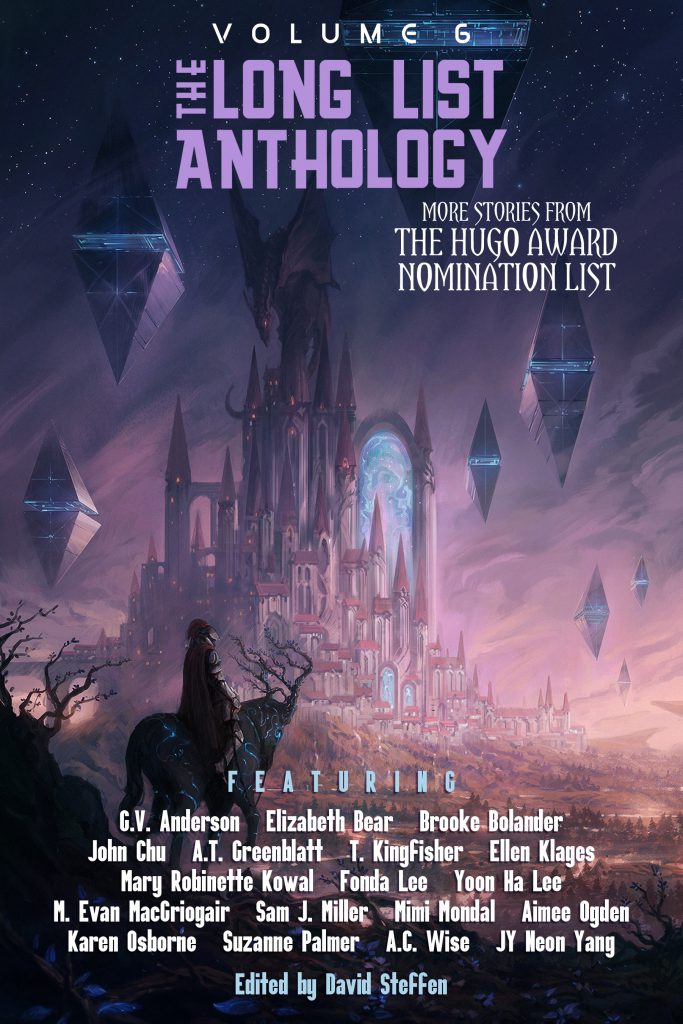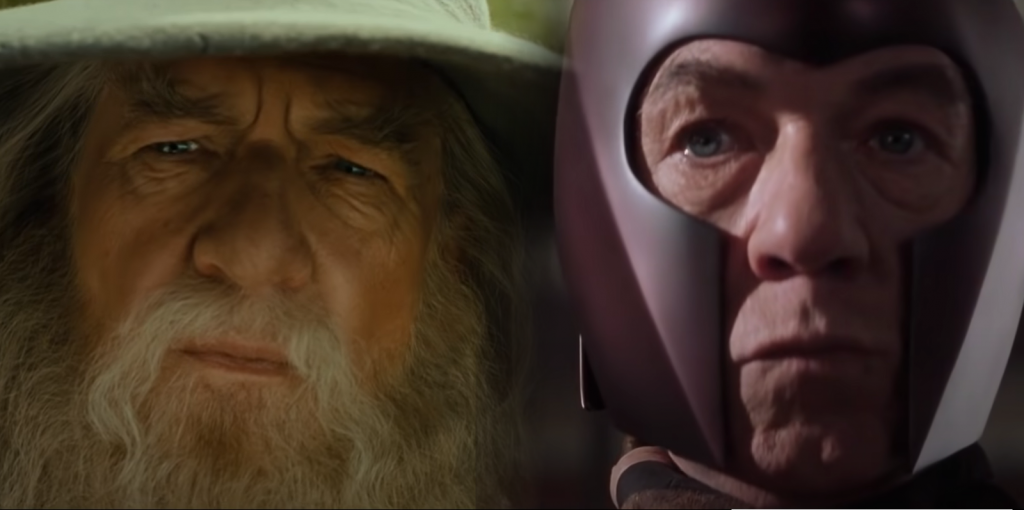written by David Steffen
Hello! This is one of those posts where I declare what is eligible for speculative fiction awards (such as the Hugo and Nebula and Locus) and in what category from Diabolical Plots offerings.
Semiprozine
Diabolical Plots itself is eligible for the Hugo Award for Best Semiprozine.
Editor (Short Form)
David Steffen is eligible for the Hugo Award for Best Editor (Short Form), for both Diabolical Plots as well as The Long List Anthology Volume 6.
Publisher
Locus Awards have a category for Publisher, which would be Diabolical Plots, L.L.C. for Diabolical Plots, Long List Anthology Volume 6, as well as being the entity responsible for The Submission Grinder.
Best Reprint Anthology
For the Locus Award!
Related Work and Fan Writer
Websites that relate somehow to science fiction and fantasy are eligible for related work. So I believe Diabolical Plots as a whole is eligible, and I am eligible as “Fan Writer” for my work here.
Individual works of nonfiction are definitely eligible so individual pieces on Diabolical Plots, whether reviews or otherwise, are eligible.
This year marked the start of a series of articles I’m quite fond of: Music Video Drilldown, in which I analyze a professional music video as though it were meant to be a regular film instead of a music video–trying to understand the plot. Many of these end up being quite speculative.
And very recently I started a new series on Universal Transitive Headcanon–a metafictional framework of my own devising. In a nutshell, it is based around the idea that every character played by a particular actor is all part of the same character continuity, and every actor who plays a particular character (i.e. often rebooted ones like James Bond or Batman) are also part of the same character continuity. The concept is explained in more detail in this foundational post, and the first of the actual articles was posted very recently: The Story of Gandalf and Magneto.
And The Submission Grinder may be eligible as well! People ask me every year what they can nominate it for. (I think it would be very unlikely to win since that is a tool for writers and Hugos are voted by broader group than just writers but it is probably eligible anyway.)
Also, this may be a little bit odd of a suggestion, but the cross-stitch on the Diabolical Plots Twitter feed could be a related work. In 2020, in particular, I finished The Mighty Samurai, a project that took me FOUR YEARS to complete and which I chronicled step by step on the Twitter feed. There are also other cross-stitch projects completed in that time, including a Stormtrooper helmet, but The Mighty Samurai is certainly the most notable of this content.
Professional Artist

Diabolical Plots commissioned one artwork this year, for the cover of The Long List Anthology Volume 6, which was produced by Jorge Jacinto. I believe his work would fall under the Professional Artist category by Hugo Award definitions. Check out his website.
Short Stories
This year only one of my own stories is eligible:
“Love From Goldie” by David Steffen, at Zooscape
We used to be so close. What happened between us, Gloria? Is it because I died? I would never have thought our marriage was so superficial. For Christ’s sake, we’d been married for eighteen years! And now you won’t even talk to me, won’t even look at me. I’d never even believed in reincarnation, but here I am. I guess reincarnation believed in me.
All of the original fiction published by Diabolical Plots falls into the “Short Story” category as defined by both the Hugo and Nebula and Locus awards (meaning that each is under 7500 words apiece). The eligible stories are listed here with the announcement of Year Six fiction–but only those with 2020 dates, the ones with 2021 dates are eligible next year instead. Note that if you’ve been following along from previous years that this is a change from previous years–the last couple of years had had an anthology published early in the year that contained all of the story from April of the year to March of the next year–when that happened those stories were all first published in the anthology, and so the first 3 months of stories published on the site the year after were actually eligible the year before because of the anthology. These anthologies have been discontinued and so now “date on the site” is the only publication date to be considered. This means that even though Diabolical Plots has continued to publish two original stories every month, this year only 9 months of those stories are eligible (April through December). You can find all Diabolical Plots fiction here.
For the sake of convenience, here is a list of the eligible short stories with links and brief excerpts:
“A Promise of Dying Embers” by Jordan Kurella
It is a long way down to the sea. A long way down, and treacherous. But I must make this journey today from my uncle’s castle, carrying his bones. I must make this journey, both for my uncle’s bargain, and for my own.
“On You and Your Husband’s Appointment at the Reverse-Crematorium” by Bill Ferris
You place the urn carefully onto the examination table. The doctor opens the lid, takes a peek inside, sniffs a little. He nods, like he’s evaluating a new blend of coffee, then dumps half of your husband’s cremains into a big metal mixing bowl, the kind they had in the restaurant kitchen you used to work at. He uses a large copper whisk to mix in a bottle of purified water.
“Everything Important in One Cardboard Box” by Jason Kimble
Max found the box that fit absolutely everything when he was clearing space for Roderick to move in. They had agreed he’d pare down to a single bookshelf, so he drove by the local rental place and bought a half dozen boxes.
“Synner and the Rise of the Rebel Queen” by Phoebe Wagner
The Greyhood Gang created the boards to escape the guards. The Gallows Hand Gang modified the design with runes, potion washes, and badass art. The last gang, the Blacksmith Bitches, put the boards to their true purpose: rooftop raids on the rich.
“Open House on Haunted Hill” by John Wiswell
133 Poisonwood Avenue would be stronger if it was a killer house. There is an estate at 35 Silver Street that annihilated a family back in the 1800s and its roof has never sprung a leak since. In 2007 it still had the power to trap a bickering couple in an endless hedge maze that was physically only three hundred square feet. 35 Silver Street is a show-off.
“The Automatic Ballerina” by Michael Milne
Cassia works leg-like appendages below its central chassis, tossing a frilly grey tutu out in a jellyfish whorl. It has a choice now: it could approximate anthropomorphic performance, occasionally wobbling, rotating its abdominal segment in concert with its lower half. It could fix its gaze on a sculpted sconce in the middle distance; it could mime fending off an impossible nausea. It chooses not to.
“Minutes Past Midnight” by Mark Rivett
Ruth slammed through a metal security hatch. Solid steel met Ruth’s super strength and speed, and it shredded like tinfoil. From Ruth’s perspective, the world was frozen in time. Soldiers were posed in action – walking through halls, manning their posts, and otherwise going about the daily business of staffing a nuclear missile silo. None of them would be aware of the super hero in their midst. Only later – instantaneous in their perception, but many long seconds in Ruth’s – would they experience her intrusion: ruined passageways and an obliterated weapon.
“Bring the Bones That Sing” by Merc Fenn Wolfmoor
The bird bones arrived on Grandma’s porch every day at dusk with no warning. There were all kinds of skeletons, each distinct: finches, crows, goldfinches, tiny barn owls, starlings, and once, a blue heron that had covered nearly the entire stoop.
“Finding the Center” by Andrew K Hoe
I brought Annie to my math-racist’s because I’d stolen a laptop from the Syndicate. I’d stirred the vipers’ nest. Their reach was long, and I didn’t have anywhere to take her. Last year, they’d killed Annie’s mother—a trained policewoman—using crooked cops from our own precinct. So Annie went where I went—even to Sanger’s beat-down porch.
“For Want of Human Parts” by Casey Lucas
The woman cuts down the street in her high-heeled shoes and descends to St. Patrick Station with her blood-red lipstick and victory rolls. The flare of her skirts and the streak of her eyeliner remind Bone Pile of a bygone era, not that it knows what a bygone era is. But something about her feels like home. Like a place Bone Pile can still remember.
“The Last Great Rumpus” by Brian Winfrey
Except for me, he goes unseen and untouched by the world. But animals can still sense him somehow. So, as he drifts among them, dogs tense and huff and growl. Finally, the boldest of them, a pug, lets out a high-pitched squeal of a war-cry and charges.
“That Good Old Country Living” by Vanessa Montalban
Phase Two consists of a trip outside Sector 684. It’ll take us two days to reach the human-curated farm fields. We’ll have the chance to see how our creators lived before the dark decline. How they coexisted with their animals in vast, clear-skied land.
“A Complete Transcript of [REDACTED]’s Video Channel, In Order of Upload” by Rhiannon Rasmussen
Dark kitchen, grainy. Camera, low resolution, is pointed at a cooking range with dented skillet resting on it. Both are crusted with food and what appears to be rust. The stovetop paint is flaking off in layers. Over the side of the skillet, a lump which appears to have hair in it is visible. A black sheet has been draped across the counter behind the cooking range. After a moment of rustling, it becomes apparent that hands in black gloves have been in view.
“Are You Being Severed?” by Rhys Hughes
He was lost in the guillotine section of the big department store. He could never have guessed there was such a thing, or he might have taken more care when the doors of the elevator opened and let him out. He was on the wrong floor. The lighting here was dim and bloody, the lamps shaded to deliberately cast a gory glow over the items that were on sale. It was crude and unfair. By the time he realised his error he had already wandered too far into the enormous room and his sense of direction was confused. He had no idea how to get back to the elevator.
“Many-Faced Monsters in the Backlands” by Lee Chamney
On the third day, while using the washbasin, I saw my face had become asymmetrical. As I watched, the left side fattened. I put a hand to it and felt the bones below shift. The left side soon contaminated the right, and my face became someone else’s. It looked at me with eyes not my own.
“Mama’s Hand of Glory” by Douglas Ford
Mama’s hand normally stayed inside the dining room cabinet, the kind that most families used for nice china. With it just me now, I used ours for other stuff, like interesting bones and rocks I came across. Naturally, Mama’s hand was the centerpiece. I picked it off the floor—fortunately, far enough from the vomit that it didn’t need cleaning—and placed it back on its display rack. I judged that it looked ok, despite one finger, the one that would’ve held a ring if Mama had ever gotten married, hanging off kind of funny. The pinky, along with most of the dried flesh under it, was gone completely. It didn’t look how Mama intended. But the tattooed planchette on the back didn’t suffer much damage, so I suspected it would still work.
“‘My Legs Can Fell Trees’ and Other Songs For a Hungry Raptor” by Matthew Schickele
The junction of tunnels here had a rich sound, and the soft buzz of her bagpipes echoed in every direction. Just like yesterday, and the day before, she relaxed on a pile of stones, lost in the music, sifting her memory for favorite tunes from the timeworn canon. The bellows for the pipes was a ballooned mammal-skin bag on the floor, massaged by her large clawed feet; her small front claws tickled melodies on the chanter. Leathered intestines connected all the parts, snaking along her feathers from the bag up to her massive jaw.
“Tony Roomba’s Last Day On Earth” by Maria Haskins
It’s Tony Roomba’s last day on Earth. After two years of working undercover as a vacuum cleaner bot on this boondock planet, he is finally heading home to the Gamma Sector, but his final day is full of challenges. He has to get out of the apartment undetected; has to reach the extraction point in time for teleportation; and he has to submit his intel-report to the Galactic Robotic Alliance (not that they’ll like it much). However, his most immediate and hairiest problem, is that he can’t get Hortense off his back.



